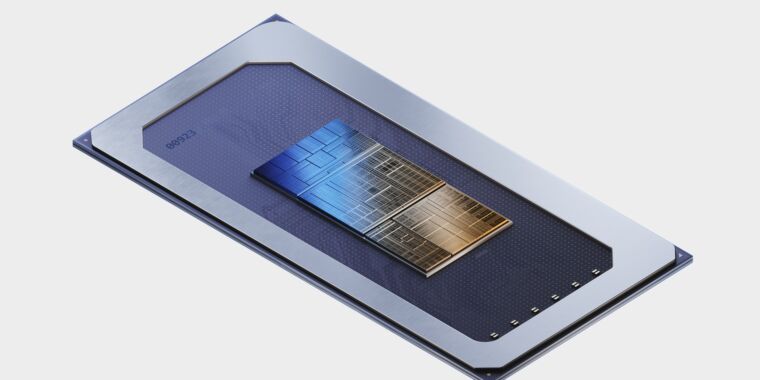Intel doesn’t think that Arm CPUs will make a dent in the laptop market::“They’ve been relegated to pretty insignificant roles in the PC business.”
A brief history lesson relating to Intel and ARM… Intel made ARM processors. They were not great. Of course, this was many many years ago, but even compared to others of the same from the same generation and year range, they were kind of poo.
The product was Intel Xscale. Manufactured starting in 2002, and only lasted about 3-4 years before being dropped. Right before there was a big smartphone boom. The processors found their way into the smartphone predecessor, the PDA. Notably, I purchased one device with this type of processor right before the whole thing collapsed… A Dell Axiom x51v. It ran Windows Mobile, which later turned into Microsoft’s attempt to compete with the likes of Google and Apple in the smartphone space, and it’s obvious how that worked out for them.
Intel is saying this because they have to believe it’s true. They’ve abandoned all ARM development and seem to have no intention of picking it up again. They failed in the ARM space, creating fairly poor versions of the chips that they did produce, and they seem to have no intention of repeating that failure.
Mark my words, Intel will likely go all in on RISC-V if anything. They’ll continue to build x86, they have way too much invested in that space and it’s one of few that they’ve actually had significant success in, but when it comes to mobile/RISC, ARM isn’t something that they will be picking up again.
So bluntly, this is true… For Intel. They must believe it because they have given themselves no alternative.
Of course intel would be the last company to admit x86 is dying. It just doesn’t make sense to keep doubling down on it anymore, Apple has proven ARM is more power efficient and in many cases more powerful than x86. I wanted to buy a new laptop this year but it makes no sense to do so considering Windows ARM machines are right around the corner and will triple battery life and increase performance.
Underestimating the competition is often a path to failure
Nobody tell Intel about Apple Silicon! Or that Apple’s sales are increasing while they rest of the industry is in a slump.
you clearly don’t know what you’re talking about. Apple’s laptops sales are decreasing. And most Mac users can’t tell the differences between Intel, the M chips, AMD or whatever. They just know that there’s a pretty apple on the back of their laptop and that’s why they buy it.
Apple’s laptops sales are decreasing.
Right now. But that’s because the M1 and M2 Mac sold like hot cakes and we’re at a quiet stop in the product timeline. They pick right back up when the new models drop.
And most Mac users can’t tell the differences between Intel, the M chips, AMD or whatever.
This is silly. The M1 models were leaps and bounds better than the Intel predecessors. That’s not all due to the ARM chip, but list a “MacBook Air 2020” for sale and watch the Mac heads stumble over each other to ask “intel or m1”.
They just know that there’s a pretty apple on the back of their laptop and that’s why they buy it.
People generally tend to stick to one ecosystem because of lock in effects, such as investment in apps etc, but that’s equally true in the windows world. I’m not sure I would classify Mac users on the whole as tech illiterate though. Most know exactly what they are getting and why.
And they are also A LOT of Mac users that just want a decent Unix machine and sturdy, capable hardware.
As a owner of an ARM laptop: wtf are they smoking?
Intel is doing all the things dying companies do.
I hope I’m wrong about this, but I don’t think I am.
Even AMD showed just how power hungry and thermal inefficient intel generally is
As Arm develops more every year, laptop OEMs will eventually switch just because of the insane power and thermal benefit.
I hope RISC-V gets its chance to shine too
No laptop manufacturers would switch to arm until a good x86 compatibility comes along. People would make huge fuss if they can’t use their favorite apps or if those apps don’t run decently
There’s already CPUs with extra instructions specifically designed for efficient emulation of other instruction sets. This includes ARM CPUs with x86 emulation at near native speed.
Wouldn’t adding a bunch of extra features to an ARM CPU make it become less power efficient and more like x86?
I’ve heard that ARM isn’t inherently more power efficient in some special way over x86, x86 has just been around so long and has had so many extra instructions added to it over the years, but that’s what allows it to do so much / be so performant. If you took an ARM CPU and did the same you’d have roughly the same performance/watt.
Yes and no, it’s not about the instruction set size but about general overhead.
The x86 architecture makes a lot of assumptions that require a bunch of circuitry to be powered on continously unless you spend a ton if effort on power management and making sure anything not currently needed can go into idle - for mobile CPUs there’s a lot of talk about “race to idle” as a way to minimize power consumption for this exact reason, you try to run everything in batches and then cut power.
The more you try to make ARM cover the same usecases and emulate x86 the more overhead you add, but you can keep all that extra stuff powered off when not in use. So you wouldn’t increase baseline power usage much, but once you turn everything on at once then efficiency ends up being very similar.
They already have with Apple M1 Macs
The M series from Apple has singlehandedly convinced me ARM is the future. The battery life we get with the performance they provide is insane.
Posturing. It’s already obvious that Arm is kicking ass. It may not take over, but it’s more than made a dent.







